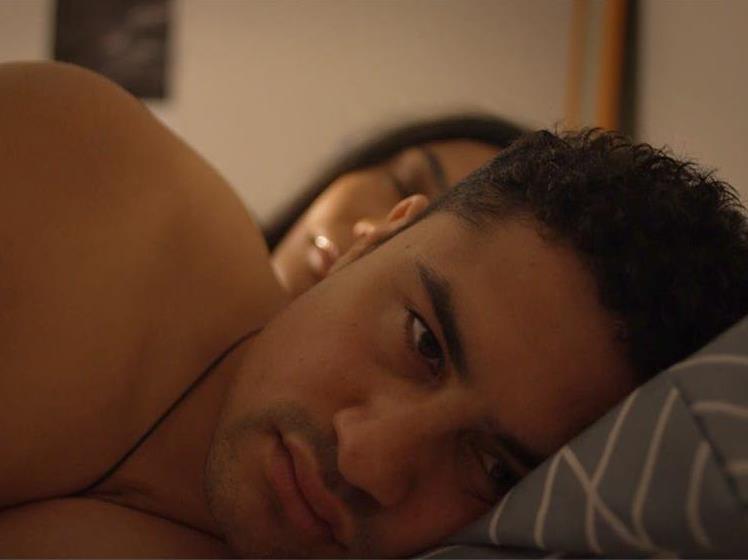A still from the New Zealand television series Ahikāroa. Image supplied.
Last week I was working with two men in an intimate scene, where the characters pash, undress each other, do a striptease, have problems with putting a condom on, spill lube all over the bed, roll around, and ultimately make love. Halfway through the scene I call “hold”, and step in with a towel, ask one of the actors to ‘lift’, and strategically place the towel between their genitals to make sure they don’t touch.
Why me?
If you’d told me a year ago that this is what I’d be doing on sets I would’ve been like WTF? But actually, it’s a perfect fit for me. Intimacy coordination is like if directing, advocacy, and physical storytelling had a threesome, and I get to watch.
I was first approached by Nicola Smith, the producer of Ahikāroa to do this role. Ahikāroa is the first Māori bilingual TV serial drama. They have a lot of young inexperienced actors, and a decent amount of sexual content. They wanted to make sure that they were keeping their actors safe, while fulfilling the twists and turns of the story. I was really flattered that the directors had asked for me, but I was also like ‘ummmmmm…..why me?’
Taking the lead on addressing power imbalance
It strikes me that Ahikāroa is leading the way in a lot of areas. They are low budget and very ambitious, but because they are new, there is a freedom there that maybe doesn’t exist in bigger, more established productions. While other shows might say ‘We’ve never had an intimacy coordinator before, why do we need one now?’, Ahikāroa says ‘We are doing this all for the first time. Let’s do it right’.
I’ve always been passionate about working with rangatahi [young people], and it felt really a natural fit for me to step into a role where I am holding a space where spiritually, physically and emotionally young actors feel safe and empowered.
After #MeToo, Weinstein, and the Time’s Up Movement, the film industry worldwide is finally starting to think about how to address issues of safety, abuse, and power imbalance in our industry. Closer to home, Rene Nafahu’s name suppression was lifted and the issue was something that existed right in amongst my own circle of colleagues and friends.
Related reading: Rehearsing intimacy after #MeToo
When I first started in this line of work I started by thinking about the good and bad experiences I’ve had myself as an actress, the times when I’ve felt unsafe or objectified, the times when I’ve had a discussion with a director about how an intimate scene is going to be shot and then that changes when I’m on set. I remember shooting one sex scene where the director just wouldn’t call cut and in the end, me and the actor turned around and barrelled the camera like ‘There’s not much more we can do here unless you want us to ACTUALLY have sex’.
I also thought about the good experiences, where I felt very safe and empowered, and why those experiences were different. I remember Jane Campion saying in a workshop ‘the director should be able to go wherever they want their actors to go, and if they can’t do that, then they shouldn’t be asking you to go there’. And this is how I felt about intimate scenes. As an actor I demanded details from the director: ‘What do you want to see? What is the feeling of the scene? What kind of kiss is it?’. I became incensed if the director couldn’t communicate that to me – if they couldn’t communicate what they wanted to see, if they were too embarrassed to say the words out loud, then how was I supposed to do it without being embarrassed?
Empathy and intimacy
Ita Obrien was brought out by Equity to teach her methodology and that was a game changer for me. I understood that by using her process, intimate scenes could become like any other scene – rehearsable, repeatable, precise and FUN.
Intimacy is such a fascinating thing. Intimacy can be anything from holding hands, looking into someone’s eyes, sex, dancing, masturbation, nudity. For me one of the times I felt most violated was when I was playing a prisoner chained to a bed, and at the end of the scene the directors walked off to their next scene, without coming up to me and thanking me, and unchaining me from the bed! There was no sex involved, but it was very intimate. I just lay there crying thinking, ‘where is the empathy here?’.
Actors are yes people. It’s in our training. ‘Always say yes to an offer’. The wonderful thing about us is that we will try anything – that gets harder and harder to do as adults get older, we take less and less risks but for actors, it’s at the very foundation of the work that we do. Intimacy work is about making space for the NO. We talk about consent, and the fact that consent changes every day for every person. We do exercises to help actors get used to listening to their NO response, instead of shutting it down.
I had a discussion on set one day with Q, the executive producer of Ahikāroa, and he said ‘We want actors to be safe, but we want sex scenes to be sexy’. I think this is a common worry for people in our industry – that intimacy coordinators are going to take the fun out of sex scenes. I’ve found actually that the opposite is true. We enable directors and actors to be really specific and detailed about the story they are telling, and I believe that through this the actors and also the scene becomes more intimate, sexier, and a damn better story.
This article originally appeared at The Big Idea NZ. Read the original article.





